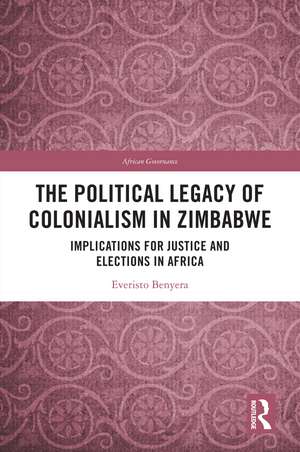The Political Legacy of Colonialism in Zimbabwe: Implications for Justice and Elections in Africa: African Governance
Autor Everisto Benyeraen Limba Engleză Hardback – 18 noi 2024
Using the case study of electoral and justice institutions in post-colonial Zimbabwe, the book explores how those in post-colonial states relate to and with institutions initially designed to oppress them and remain structurally and systematically colonial. The book argues that the colonial era colonised the land, knowledge, and minds of Africans, resulting in injustice and epistemicides. The book demonstrates how the critical institutions of elections and justice have been rendered anti-black and toxic. The book calls for Africa to invest in epistemic independence, unencumbered by Western political modernity, and then deploy that independence to build reconstituted institutions, structures, and systems that serve the interests of Africans.
This book will be an important read for African policymakers and researchers working on African politics, governance, and international relations.
Din seria African Governance
-
 Preț: 310.55 lei
Preț: 310.55 lei -
 Preț: 385.47 lei
Preț: 385.47 lei - 18%
 Preț: 1005.63 lei
Preț: 1005.63 lei - 18%
 Preț: 1000.27 lei
Preț: 1000.27 lei -
 Preț: 388.90 lei
Preț: 388.90 lei -
 Preț: 389.66 lei
Preț: 389.66 lei -
 Preț: 377.73 lei
Preț: 377.73 lei -
 Preț: 389.66 lei
Preț: 389.66 lei -
 Preț: 382.47 lei
Preț: 382.47 lei -
 Preț: 379.48 lei
Preț: 379.48 lei -
 Preț: 382.16 lei
Preț: 382.16 lei -
 Preț: 389.66 lei
Preț: 389.66 lei - 31%
 Preț: 765.03 lei
Preț: 765.03 lei -
 Preț: 388.90 lei
Preț: 388.90 lei -
 Preț: 389.66 lei
Preț: 389.66 lei -
 Preț: 380.36 lei
Preț: 380.36 lei - 18%
 Preț: 898.00 lei
Preț: 898.00 lei -
 Preț: 379.09 lei
Preț: 379.09 lei -
 Preț: 384.09 lei
Preț: 384.09 lei -
 Preț: 387.75 lei
Preț: 387.75 lei - 18%
 Preț: 1000.51 lei
Preț: 1000.51 lei -
 Preț: 389.66 lei
Preț: 389.66 lei - 26%
 Preț: 764.69 lei
Preț: 764.69 lei -
 Preț: 382.95 lei
Preț: 382.95 lei - 18%
 Preț: 1005.48 lei
Preț: 1005.48 lei - 26%
 Preț: 763.39 lei
Preț: 763.39 lei -
 Preț: 326.49 lei
Preț: 326.49 lei -
 Preț: 386.00 lei
Preț: 386.00 lei - 16%
 Preț: 260.33 lei
Preț: 260.33 lei - 18%
 Preț: 1004.55 lei
Preț: 1004.55 lei - 18%
 Preț: 998.43 lei
Preț: 998.43 lei - 18%
 Preț: 1000.27 lei
Preț: 1000.27 lei
Preț: 935.88 lei
Preț vechi: 1028.43 lei
-9% Nou
Puncte Express: 1404
Preț estimativ în valută:
179.08€ • 187.48$ • 148.18£
179.08€ • 187.48$ • 148.18£
Carte tipărită la comandă
Livrare economică 07-21 aprilie
Preluare comenzi: 021 569.72.76
Specificații
ISBN-13: 9781032791586
ISBN-10: 1032791586
Pagini: 210
Dimensiuni: 156 x 234 mm
Greutate: 0.55 kg
Ediția:1
Editura: Taylor & Francis
Colecția Routledge
Seria African Governance
Locul publicării:Oxford, United Kingdom
ISBN-10: 1032791586
Pagini: 210
Dimensiuni: 156 x 234 mm
Greutate: 0.55 kg
Ediția:1
Editura: Taylor & Francis
Colecția Routledge
Seria African Governance
Locul publicării:Oxford, United Kingdom
Public țintă
Academic and PostgraduateCuprins
Acronyms viii 1 Historicising Elections and Justice in Zimbabwe 1 2 On the Nullification of the Post-Colonial African State 21 3 The Political Legacy of Colonialism on the Post Colony 38 4 Colonialism, Justice, and Elections in Africa 55 5 Racism as an Ideology 82 6 Electoral Authoritarianism and Democratic Fatigue: Examining the Dynamics of Choiceless Elections in Zimbabwe 101 7 Electoral Participation and Intergenerational Rights: Is It Time for an Upper Age Limit for Voting? 124 8 The Shadow State and the Electoral Cycle: Faking Democracy 142 9 What about a Truth and Reconciliation Commission for Zimbabwe? 160 10 Reconciling Past Injustices and Pioneering Equitable Elections 184 Index 195
Notă biografică
Everisto Benyera is Professor of African Politics in the Department of Political Sciences at the University of South Africa in Pretoria, South Africa. He researches and publishes on community-based, non-state transitional justice, human rights, transitology, and decoloniality. Everisto is the immediate past editor of Politeia: The Journal of Political Sciences and Public Administration and Management. His books include The Failure of the International Criminal Court in Africa: Decolonising Global Justice (2022, Routledge) and The Fourth Industrial Revolution and the Recolonisation of Africa: The Coloniality of Data (2021, Routledge).
Descriere
Using the case study of postcolonial Zimbabwe, this book investigates the political legacy of colonialism in contemporary African institutions, exploring how those in postcolonial states relate to and with institutions which were originally designed to oppress them and remain structurally and systematically colonial.
